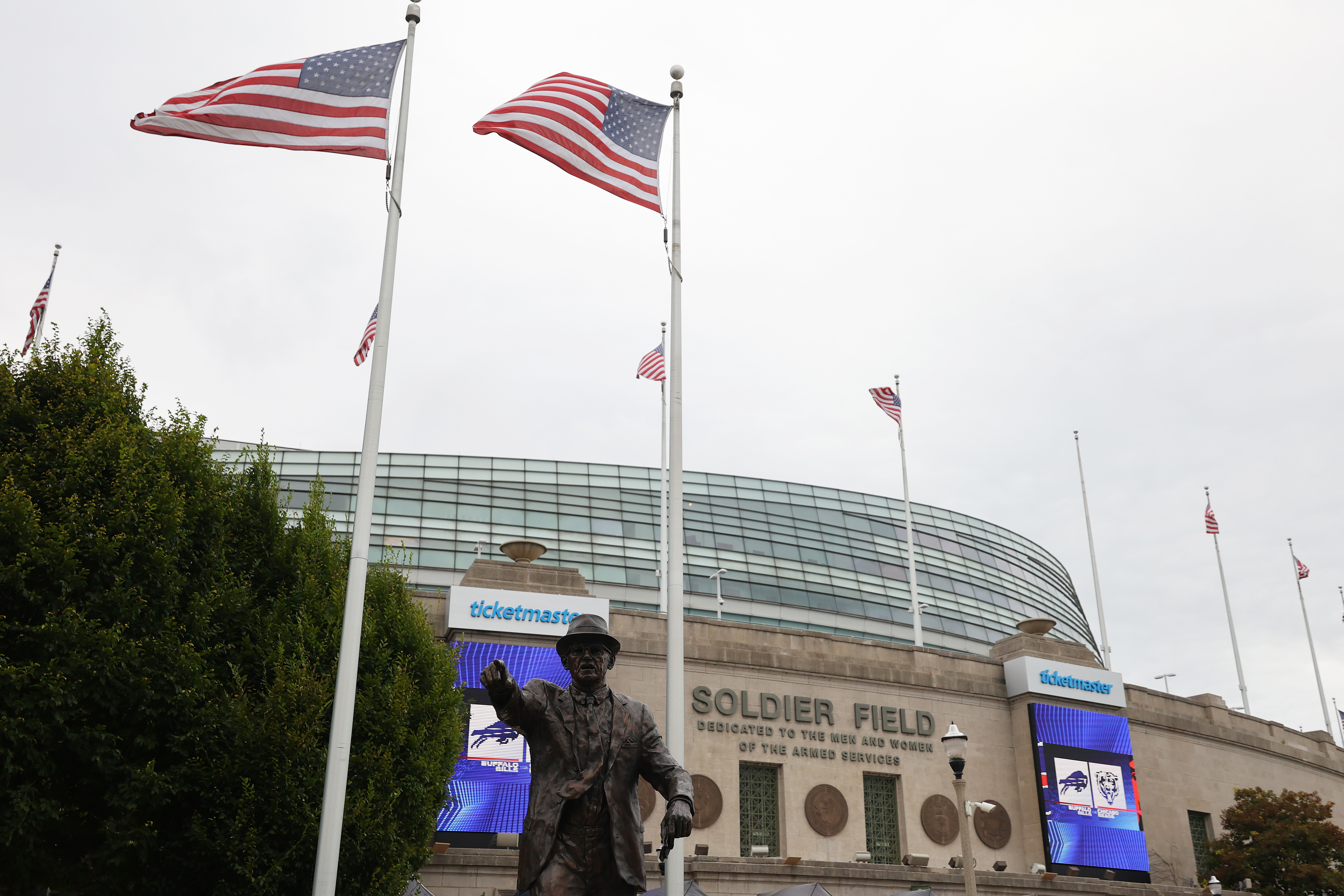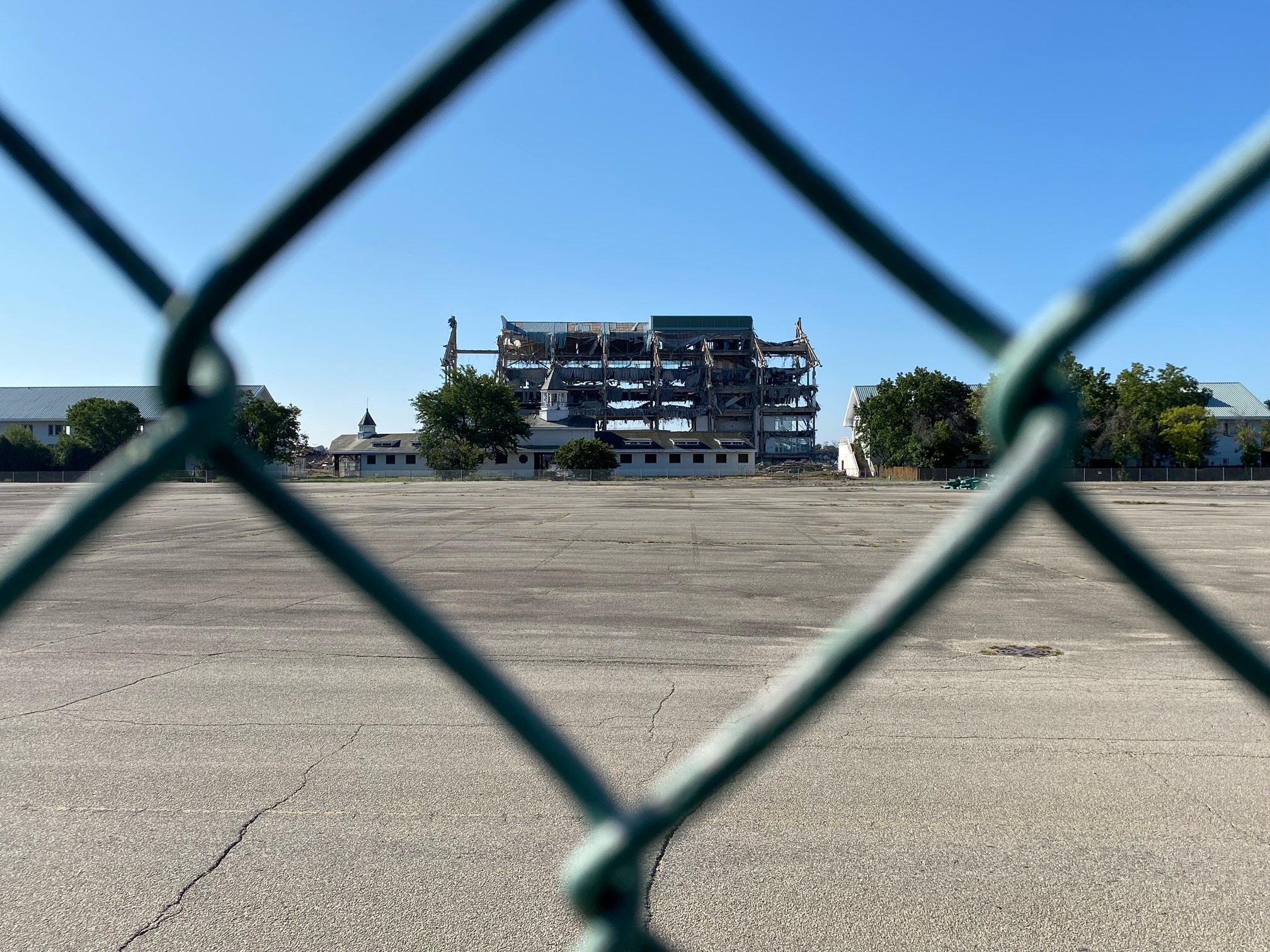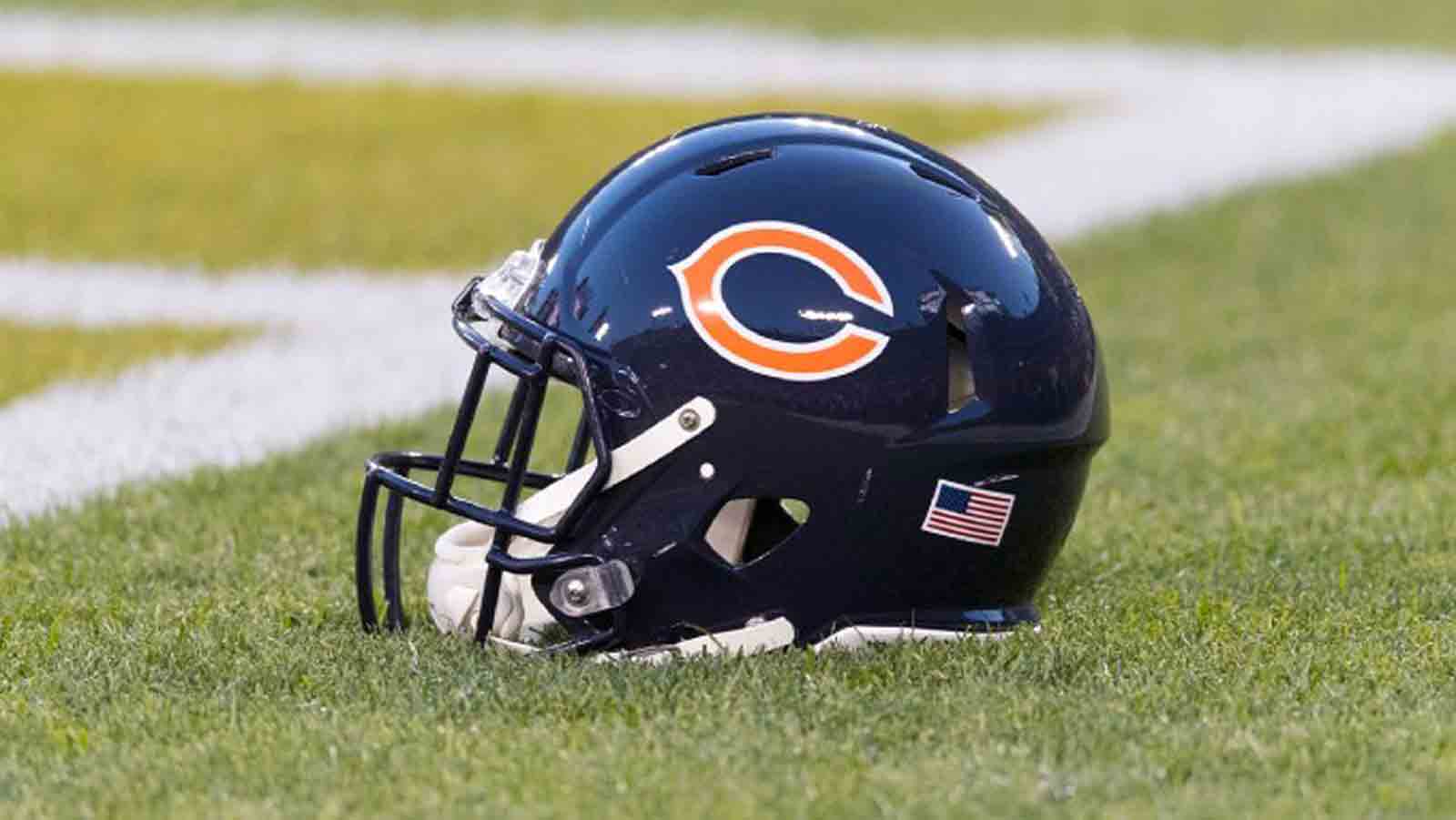A preservation group known for protecting lakefront land and parks in Chicago has responded to news that the Chicago Bears could stay in the city and build a new stadium near their current Soldier Field, alleging the team left out an important piece of the puzzle and expressing frustration over the timing of the announcement.
Friends of the Parks, which successfully sued to prevent George Lucas from building a museum along the lakefront and has previously voiced opposition to the construction of any new stadium project on Museum Campus, called out the "apparent urgency for the Bears to have a new plan in place after saying repeatedly they wanted to leave the city to develop an 'entertainment district.'"
"It has been a mere three months since news broke that they were maybe having a serious change of heart," the group said in a statement Tuesday. "Discussions about a project that will require significant public investment that could profoundly affect the literal and figurative landscape of Chicago and our neighborhoods should not be rushed like this. It is a curious contrast to how long it takes to approve and plan a new neighborhood park!"
The Bears appeared to shift focus on Monday from Arlington Heights to a new stadium in the city, committing to an investment of more than $2 billion of private funding in the project. A source familiar with the plan told NBC Chicago the new priority will be a publicly-owned domed stadium near Soldier Field, with plans to increase open space in the area by 20%.
Feeling out of the loop? We'll catch you up on the Chicago news you need to know. Sign up for the weekly Chicago Catch-Up newsletter here.
Bears President and CEO Kevin Warren confirmed the team's new intent to stay in Chicago in a statement, saying the team is "committed to contributing over $2 billion to build a stadium and improve open spaces for all families, fans and the general public to enjoy in the City of Chicago."
"The future stadium of the Chicago Bears will bring a transformative opportunity to our region -- boosting the economy, creating jobs, facilitating mega events and generating millions in tax revenue," Warren continued. "We look forward to sharing more information when our plans are finalized."
The added open space would include plazas, paths, landscaped areas, lakefront access and more. That effort -- creating more public spaces in the redevelopment of the area -- appears aimed at placating Friends of the Parks.
"No one wants to see the Chicago Bears leave the city, but we are being asked to respond as if there are no other alternative sites available or even in the vicinity of the existing stadium," the group said. "And while we appreciate that their announcement includes a nod to open space, we notice an important omission. The Bears have repeatedly prioritized commercial development in conjunction with a new stadium—it’s part of what drove them to buy and raze land in Arlington Heights. Ted Phillips, former Bears president and CEO spoke of transforming the 326 acres into a 'wonderful 365-day-a-year entertainment district.' What new entertainment district are they imagining for the lakefront?"
Friends of the Parks said while they are being reported as "the key line of defense the Bears will have to break through to achieve their goal of a lakefront stadium," they are also "proud to be known as defenders of our open, clear and free lakefront that serves public interests, not private enterprises."
"The fact that our lakefront has been protected from development is what makes it attractive to development. Without these protections we likely would not be discussing a new stadium on the lakefront as it would already be built up and privatized," the group's statement read.
The group has suggested the possibility of exploring other city locations "more suitable for development."
"For example, if the Bears really want to make a generational impact while keeping lakefront views, the Michael Reese site potentially offers the best of both worlds--the development of a state-of-the-art stadium surrounded by a residential, business and entertainment district in a community steeped in rich, Black history. It also is accessible by bus, train, car, bike, scooter and walking without disrupting the lakefront," the group said. "We did not force Lucas out of Chicago. He left because he would not consider alternatives to building on the lakefront, on land protected by the Public Trust Doctrine, in an area already slated to be developed into a park. We hope the Bears will show more vision and patience. Instead of picking up their ball and going home, we urge them to toss balls around with stakeholders to find a way to stay home in a location that preserves our open, clear and free lakefront and is a boon for neighborhood development."
While the Bears seemed to have solidly shifted their priorities for future development back to the city, they have also faced obstacles with their previous frontrunner -- Arlington Park.
The Bears do still own the Arlington Park property and pay more than $6 million a year to play at Soldier Field, according to their lease, which runs through the end of the 2033 season.
The team bought Arlington Park last year for nearly $200 million and began demolishing buildings on site shortly thereafter. The Bears said many times after purchasing the land that they needed property tax “certainty” before developing the land, and that the purchase did not guarantee that they would develop the land. For months it was assumed that was just cautious talk from the team, and that Arlington Park would be the obvious choice for the team’s next home. After all, they owned the land. But they hit an obstacle with the property taxes in the form of legal negotiations with the local school districts about the value of the site.
Despite the Chicago news, Arlington Heights said Monday the team's "continued interest in Arlington Park has not changed."
"The possibility that the Chicago Bears could find a different location has remained an option since day one and this project has never been considered a 'done deal' in Arlington Heights," the village said in a statement. "The ultimate outcome of their current discussions with the City of Chicago is unknown. What the Village knows is that the Arlington Park property provides the Chicago Bears with the unique potential to own and build a multi-use development on 326 acres, in a key location that is easily accessible by public transportation, and is centrally located for visitors and season ticket holders. The Village remains committed to ensuring that any development of the former Arlington Park site, which is unmatched in all of northern Illinois, will provide broad benefits to our community and will create a new regional destination befitting the great legacy of the property. Village leaders will not approve any plan that does not meet these expectations."
Arlington Heights said it plans to continue to work with the team and area school districts, and while it is "disappointed" the two groups "have yet to resolve short-term property tax differences," the village noted negotiations have brought the to parties close to an agreement.
“We have all experienced the many twists and turns that this project has taken over the past three years and we find ourselves in a very similar situation today. The Village’s focus remains on finding a path forward to a successful redevelopment of the former Arlington Park site. The property remains a major asset to the community and region, and it has tremendous potential,” Mayor Tom Hayes said in a statement. “The Village has always acted in good faith and partnership with the Chicago Bears and the School Districts throughout this discussion, while protecting our community’s interests, and we will continue to do so as the process moves ahead.”
Read the full statement from Friends of the Parks below:
Friends of the Parks is proud to be known as defenders of our open, clear and free lakefront that serves public interests, not private enterprises. It is easy to take our 26 miles of a continuous parks and path system—one of our city’s crown jewels--for granted. But a look to other cities with waterfronts dominated by structures of industry or luxury is a testament to the vision and ceaseless, often politically unpopular, efforts of our forebears.
The fact that our lakefront has been protected from development is what makes it attractive to development. Without these protections we likely would not be discussing a new stadium on the lakefront as it would already be built up and privatized.
What we need right now is “open, clear and free” discourse driven by the public instead of private interests. Presently, our main reaction is frustration at the apparent urgency for the Bears to have a new plan in place after saying repeatedly they wanted to leave the city to develop an "entertainment district." It has been a mere three months since news broke that they were maybe having a serious change of heart.
Discussions about a project that will require significant public investment that could profoundly affect the literal and figurative landscape of Chicago and our neighborhoods should not be rushed like this. It is a curious contrast to how long it takes to approve and plan a new neighborhood park!
No one wants to see the Chicago Bears leave the city, but we are being asked to respond as if there are no other alternative sites available or even in the vicinity of the existing stadium. And while we appreciate that their announcement includes a nod to open space, we notice an important omission.
The Bears have repeatedly prioritized commercial development in conjunction with a new stadium—it’s part of what drove them to buy and raze land in Arlington Heights. Ted Phillips, former Bears president and CEO spoke of transforming the 326 acres into a “wonderful 365-day-a-year entertainment district.”
What new entertainment district are they imagining for the lakefront?
We are interested in conversations about other locations more suitable for development. We are Friends of the Parks, not just Friends of the Lakefront. Our work spans the city. We care about how investment and developments impact communities across Chicago, especially ones that have suffered historical disinvestment.
For example, if the Bears really want to make a generational impact while keeping lakefront views, the Michael Reese site potentially offers the best of both worlds--the development of a state-of-the-art stadium surrounded by a residential, business and entertainment district in a community steeped in rich, Black history. It also is accessible by bus, train, car, bike, scooter and walking without disrupting the lakefront.
FOTP has repeatedly been referred in news coverage as the key line of defense the Bears will have to break through to achieve their goal of a lakefront stadium. We have already started receiving angry emails about how we kept the Lucas Museum of Narrative Arts out of Chicago and that we better not cause the Bears to leave. We also get plenty of thank yous.
We did not force Lucas out of Chicago. He left because he would not consider alternatives to building on the lakefront, on land protected by the Public Trust Doctrine, in an area already slated to be developed into a park. We hope the Bears will show more vision and patience. Instead of picking up their ball and going home, we urge them to toss balls around with stakeholders to find a way to stay home in a location that preserves our open, clear and free lakefront and is a boon for neighborhood development.
Sometimes, FOTP is characterized as an organization that says no. We also say: “hold on, let’s talk about this, work to ensure that all stakeholders are at the table (or on the field), explore a range of options and be creative.” We look forward to courageous conversations ahead, including with the Chicago Bears.




